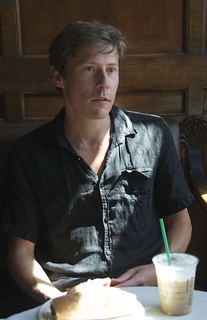 It was Andreas Norman’s idea to meet at Starbucks at Malmö Railway Station. My photographer and I have exactly two hours between trains to interview this new Swedish thriller writer, and don’t want to spend it running all over Malmö. So Starbucks seems ideal, and actually rather nice. For a Starbucks. We wait for Andreas while he gets something to eat. He apologises for having bought lunch, but he is hungry. I warn him about the inadvisability of chewing while being photographed, and we laugh.
It was Andreas Norman’s idea to meet at Starbucks at Malmö Railway Station. My photographer and I have exactly two hours between trains to interview this new Swedish thriller writer, and don’t want to spend it running all over Malmö. So Starbucks seems ideal, and actually rather nice. For a Starbucks. We wait for Andreas while he gets something to eat. He apologises for having bought lunch, but he is hungry. I warn him about the inadvisability of chewing while being photographed, and we laugh.
‘Hard to eat in a delicate manner…’ he says.
‘Think before you order.’
‘Mmm,’ he says through his chicken sandwich.
We discuss Starbucks, and summer vacations and holiday homes, and he turns out to be perfectly capable of laughing while eating a sandwich. ‘So you live in Malmö now?’
‘Mmm, we lived in Vilnius, before, in Lithuania. It was my last post. Then my wife got a job at Malmö Stadsteater [theatre], and I’d been thinking of leaving the Foreign Office, and I feel Malmö is a good city. It’s a bit quieter, a bit friendlier than Stockholm.’
‘You have no direct ties to it then?’
‘My relatives used to have a holiday home near here, so Malmö is somewhere I’ve passed through every summer, going to visit family. We didn’t know anyone when we arrived, so we had to start from scratch, building a new life here. I’ve always thought Malmö is a pleasant city. It’s interesting, it’s developing. There is a kind of openness, it’s more integrated. And there is solidarity, like when we had racist crimes and everyone came out to protest, saying this is not the way it should be. The city is still changing, from having been a working class shipbuilding city to “what’s it going to be now?”’
‘I wasn’t sure if you’re from Skåne…’
‘I grew up in Stockholm, and on my mother’s side they come from Ångermanland, and the rest from Skåne.’
‘I somehow think of diplomats and Stockholm people as being much the same… So have you left the FO now?’
‘Mmm, yes, you could say I wrote this book as a hobby. It was a chopped up kind of writing; you write on the Sunday, and travel to Brussels on the Monday, and then you are totally done in, return on the Tuesday morning and then you work all week, and a week later you ask yourself “where was I?” It was a hobby that grew, and when the publisher saw the book and said they wanted to do something with it, I realised that this was no longer a hobby; it was a choice between that or the rest. And I felt that I could always be a civil servant some other time, and I should give this all I can. I have always wanted to write; I wrote a volume of poetry in 96.’
‘That’s quite a jump.’
‘Precisely. I had some romantic notion that I could get inspiration from my work at the FO. A lot of exciting, amusing experiences that I could use. The problem is if you work 50-60 hours per week… It really forced me to write, but it took me seven and a half years to write that book.’
‘That’s a long time.’
‘It’s difficult to keep the plot together…’
‘That might explain those little details at the beginning of the book, which didn’t quite fit the end.’
‘Yes, there were cracks in the MS. Luckily Quercus sorted it out, so those problems are gone in the English translation.’ Andreas laughs. ‘I thought I will give this a go, and the move to Malmö means living more cheaply, rent is cheaper, and so on.’
‘And you have a wife who can support you…’
‘Yes, I have a wife.’ We laugh a bit, because you’re not meant to express such opinions in Sweden.
‘Have you started on book two yet?’
‘Actually, I have written another book, a documentary. I was one of the first sent out after the tsunami in 2004. Crisis management team. It’s about that experience, a reflection of the Swedish FO’s rather failed efforts. It’s mostly a day-to-day description, my work on the ground so to speak. An ordinary civil servant – I had never been to Thailand – who was thrust into this totally chaotic situation. The book will be published this October, ten years after the tsunami.’
‘Yes.’
‘Meanwhile I have worked on the plot for the next thriller, and done research. I have only written a few pages, but this time it won’t require seven and a half years, with a bit of luck.’
‘When do they want it?’
‘There’s a half-spoken request for spring 2016, alternately autumn 2015. I believe spring 2016 will be possible. I want to prepare properly, plot and structure. I’m putting myself through a tough schedule. I have made every possible mistake, and had to do an about-turn and rewrite. I also wrote 200 pages of something that was more a bildungsroman, everything from science fiction to… and I asked myself “what genre do I need to tell this story?” and that’s how the thriller grew organically.’
‘Does that mean you didn’t sit down with the intention of writing a Stieg Larsson?’
‘No, and if anyone had asked “have you read Stieg Larsson?” I’d have said “Stieg Larsson who?” I really had no clue about crime novels and thrillers, but sat down and thought “I want to write about the FO.” About the Foreign Office, about diplomatic life, but how to do it I had no idea. My wife said “have you read John le Carré? He might suit you.”’ Andreas laughs. ‘I was at that level of ignorance, you know.’
‘Perhaps you’re too young.’
‘Then I discovered Graham Greene. He’s very important to me; setting, language, and obviously plot. He describes people’s failings.’
‘It’s easy to become interested in Carina. First you invest your feelings in this person, her friends, her job, and then suddenly there is a complete change.’
‘Carina is very much me, but also inspired by women in that type of job, who work hard, who want to get on. Then I focused on Bente, in the security services. That’s two ways of looking at the relationship with large organisations [FO]. One is run over, the other one lies low and keeps her professional identity. When I started writing, Carina was a man. I got bored with the character, a young man on his way up. It wasn’t terribly exciting, so I tried writing the character as a woman, and then things started happening. Lots of diplomats in the age group 30-40 are women. It also got more fun describing this macho culture, how a woman must have sharp elbows and fight her way forward. It became an easier story to tell.’
‘She was an interesting character, in that way.’
‘Bente is a more mysterious character, with a lot of contradictory principles; on the one hand to do good, on the other working in an organisation that forces her to behave unethically. And the steady wear of secrecy.’
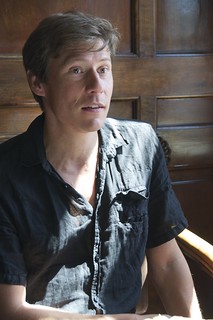 ‘With the English language translation and the fact that the book will spread across the whole world, do you think it’s wrong to portray MI6 and the others in such a poor light?’
‘With the English language translation and the fact that the book will spread across the whole world, do you think it’s wrong to portray MI6 and the others in such a poor light?’
‘Noo,’ he laughs, ‘that’s the way it is. On the contrary, I believe it will be interesting for British readers to see how MI6 relate to small countries, and their security services. That MI6 aren’t just the good guys.’
‘That’s right.’
‘They are just like any other large organisation. They are pros, they are cold, they are completely driven by UK interests. Sometimes those coincide with Swedish ones, sometimes not. And above everything they have a very instrumental vision of other countries; OK Sweden is doing something, and maybe they can help them, or persuade them to work more in line with British interests. They cooperate with the Swedish services, but at the same time they might have some operation in Sweden, which could damage Sweden. I find that interesting.
I want to describe this world of secret service or spies as it is, further away from James Bond, far from heroic sagas. I want to describe vast office floors in these anonymous organisations and how modern secret services work; how cold they are. Also how the seemingly ordinary white-collar analyst in some department is connected to elite soldiers in north Afghanistan, or to the person kicking in doors, grabbing people from planes, and so on. It’s the same toolbox,’ Andreas laughs dejectedly. ‘It’s easy to make it all rather James Bond, or glamorous, or simply cool. Or you end up with something out of Spooks.’
‘Yes.’
‘I have the feeling of whole vast organisations, that it’s not about a single hero but that they are large machines. And after Edward Snowden it feels a bit like kicking in an open door, so to speak. My book came before the Snowden leak, so I am able to say “what did I tell you?”’
‘In future people won’t know that. I gather there was some discussion about changing which Middle Eastern conflict you use in the book, but I felt it wouldn’t have made sense to change it. Things happen fast and soon it would be yet another country, anyway.’
‘Exactly. It’s just background.’
‘The latest country in crisis.’
‘I wanted to describe everyday work; one day the Ukraine, the other North Africa. But I have to admit to some surprise when – based on my knowledge of the secret service and signals intelligence, which I took and argued that “assuming that technical development continues, and this insatiable appetite for more and more control, more and more secrecy, which these organisations have; if you take the two and stretch out the lines a little, then within a few years you have…” – I wrote like that, and it happened to be spot on, with the NSA and GCHQ…’
‘It was fun to find the Guardian as a bit of a hero.’
‘Mmm, press and media play an important role in democracy, and for me it was also “how do I end this whole thing?”’ We laugh. ‘In reality it never ends, it just keeps going.’
‘Have you had any early interest from the UK?’
‘I’ve just been doing some Q&As this morning, for pitching to newspapers, and I wrote a few blog posts, and they are looking for an interview. I feel humble about any attention I might get. I am a debut writer and haven’t got a trilogy. There is no package…’
‘No.’
‘My book has been well received in Sweden, and it sells OK. But it’s a slow grower, unlike Jens Lapidus’s Easy Money, for instance. On the other hand, many bestsellers have grown like that.’
‘Do people know who you are if they meet you?’
‘No, it’s more when I write articles for Aftonbladet, that people might know my book. It has sold 30,000 to 40,000 copies. I don’t sense that it has reached the point when it suddenly makes it, everyone reading it. But I hadn’t expected that. I think it’s too hard to digest for that.’
‘Do you really?’
‘Mm, it’s quite technical in places. But I think it could be well received by people who read John le Carré as well as Joyce Carol Oates. And now I have this tsunami book as well.’
‘From poetry to thriller to tsunami documentary.’
‘Precisely, it was so traumatic and so many things went wrong and so massively, that the government nearly collapsed.
Then this sequel, there will be more focus on Bente. Her whole life has been divided between the private and the professional, a silence straight through, and where her private life collapses for professional reasons, and she is forced to accept that she has brought the cold war home with her. The Secret Service is like a cold war, but also the cold war that can break out in a relationship in crisis.’
‘Interesting.’
‘It will be more of a blend of signals intelligence and psychological thriller, an ice cold cat and mouse game. I’ve always tried to avoid making it too much blood-stained gore…’
‘That’s right. I re-read Lotta Olsson’s review – in Dagens Nyheter – yesterday and was struck by what she says about how you pulled this off with barely spilling any blood at all.’
‘I believe that’s important,’ he is still chewing, ‘there is something cynical about descriptions of violence that are almost pornographic. It turns into entertainment violence, for real, if you write as some do; with people executed in the most bizarre ways, and that means that you hardly notice the real violence that actually exists. I want reality to be described the way it is, as non-violent. When violence really does get used, because there is violence within the secret services, violence is one of the tools, and when it is used it is very scary, and you should feel it. You’re gasping for breath, when it really happens. Often it is the knowledge that these people can use it, that they are allowed to use it, and no one will be put on trial for doing so. You find yourself in a legal limbo, where you are at the mercy of the psychopaths.’
‘Have any of your colleagues “recognised” themselves in your book?’
‘Yes, they have. Many colleagues, old ambassadors and bosses,’ we laugh merrily, ‘write happy messages on Facebook and email, saying how marvellously entertaining the description of the Foreign Minister was, and what fun it is that I have nailed these details, that you find at the FO; everything from how you order an office chair to the general mayhem that breaks out every time the political leaders are changed. Many have been pleased I have described the FO as a place of work and not just an FO with cocktails…’
‘Yes, it’s a new kind of FO you meet, where normal people work. Almost normal people.’
‘You find things you will recognise if you work in an office, any office; how to get a good chair and playing power games to get a better room.’
‘Who keeps track of what. There was a woman, I think she was doing some photo copying, whom you described as having a silent sort of power…’
‘That’s right.’
‘…and I expected her to have more of a role later in the book, because it was as though she would turn out to do something special.’
‘Exactly. I planted masses of clues that I then went on to forget about,’ he laughs at himself. ‘That portrait was of the personal secretary of the Head of the Security Policy Department.’
‘Does it feel odd to read your words in another language, when you didn’t write them yourself?’
‘Mmm, yes, but in a good way. It’s a funny feeling because you have some distance, it really does become its own book. The book stands alone, and it’s refreshing to see phrases again, which I didn’t notice when I read it in Swedish, because then I could still remember my own memories from the writing.
The English text is purer in that respect. It wasn’t part of my writing process, and it’s nice to see how the tone of it sounds different. A British sound, that’s cool to find. I think it’s a book that will suit British readers. There is a long tradition for this type of classic spy thriller. I suspect it might suit British readers better than Swedish ones, actually.’
‘Perhaps that’s what I sensed, as I don’t read much in Swedish, but I felt right at home with this. You don’t name the Swedish Foreign Minister, but you do Theresa May. Why?’
‘For me it was to give a bit more colour, to make Swedish readers understand who I had in mind, if anyone wants to google her to find out more. But the way I wrote about the Foreign Minister, quoting his blog and all that, will just make people laugh, as they know exactly who he is. Perhaps for British readers I should have written Carl Bildt. But I poke fun at him, so to be safe I didn’t name him.’
‘Do you reckon viewers of Wallander on television in the UK will be ready for your book?’
‘Oh, I do. Partly there is a big interest globally in Swedish crime, but particularly in the Anglo-Saxon world. Swedish thriller writers are big, and with Edward Snowden I believe that people are ready to read this kind of story. It’s timely. Anyone who reads the papers will know what the NSA is. Everyone has opinions about their secret work. Today people know so much more, and it has prepared the ground for this kind of fiction.’
‘I heard that your book has come from the printers now.’
‘Precisely.’
‘Have you seen a copy yet?’
‘No, but it should arrive any day. I am pleased with the cover; clean and good looking, and it’s rather fun that they have photo-shopped all kinds of Stockholm silhouettes.’
‘I didn’t notice those.’
‘I’m a bit a bit nerdy, but I like it. They’ve done a professional job. I expect the book will develop over time. That would actually suit me quite well. I have no wish to be one of those one hit wonders.’
‘No.’
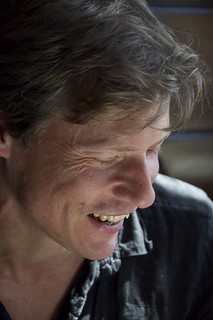 ‘My next book… my Swedish publishers were a little worried, “remember you’re writing a thriller!”’ He laughs. ‘I might not write the kind of package that makes agents and editors feel safe, initially.’
‘My next book… my Swedish publishers were a little worried, “remember you’re writing a thriller!”’ He laughs. ‘I might not write the kind of package that makes agents and editors feel safe, initially.’
‘You shouldn’t write the same as everyone else, just because people expect it.’
‘Precisely. There is a certain expectation how it should look, and even in the early discussions I noticed that they expect a direction, the plot, the characters, and how the story will be structured. That way the publishers feel safe. Whereas I reckon they are simply recognising 20 other books, and there is no point in writing that.’
‘Better when someone is brave enough to write something different.’
‘Yes, my book is relatively classic in style, it’s a classic political thriller, but I still try and do my thing with it.’
So there you have it; clean and good looking, and classic. Could apply to both author and book. Chicken sandwich elegantly – well, almost elegantly – disposed of, Andreas makes sure he ‘gets rid of’ us, and we do indeed catch our train, over The Bridge.

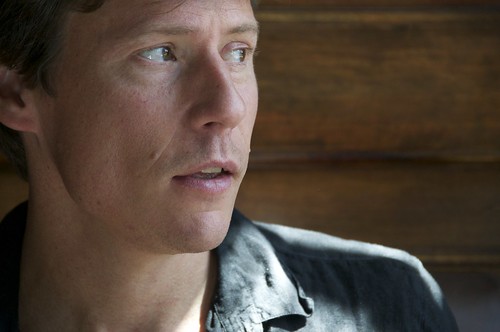
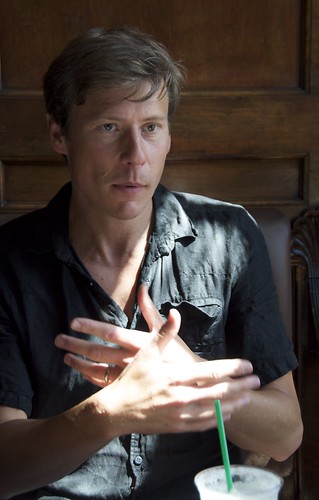
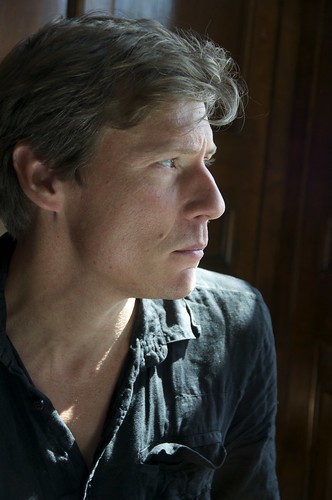
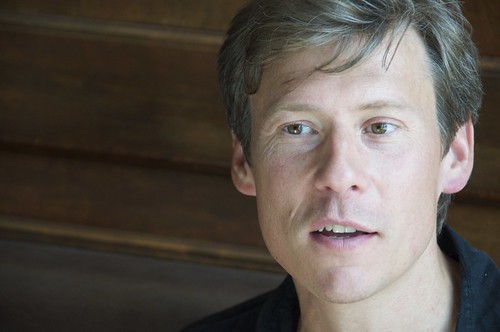
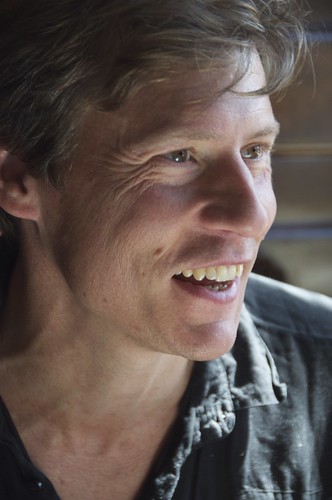
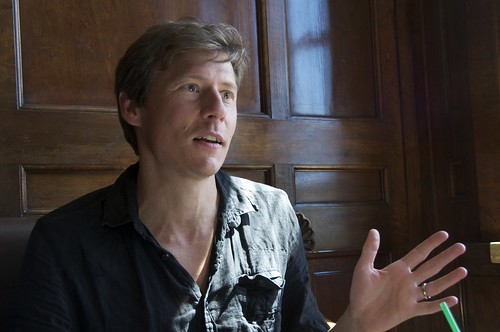
Pingback: Andreas Norman and the chicken sandwich | Bookwitch